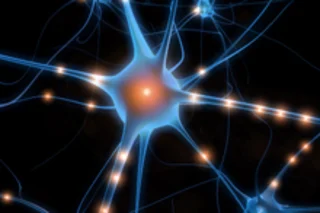In recent weeks we've covered new experimental treatments that involve injecting stem cells into patients to treat conditions like stroke and spinal injury. But in a new study, British researchers have pinpointed the possibility—in rats at least—of stimulating the body's own stem cells to repair the chronic damage brought on by multiple sclerosis. In MS patients, the immune system mistakenly attacks what's called the myelin sheath, the protective layer around the axons of nerve cells.
The loss of myelin in MS sufferers leads to damage to the nerve fibres in the brain that send messages to other parts of the body, leading to symptoms ranging from mild numbness to crippling paralysis. [AFP]
So a team led by Robin Franklin experimented with rats that had central nervous system damage, which serve as animal models for MS. The researchers then looked for a way to signal the rats' brains to repair the ...














